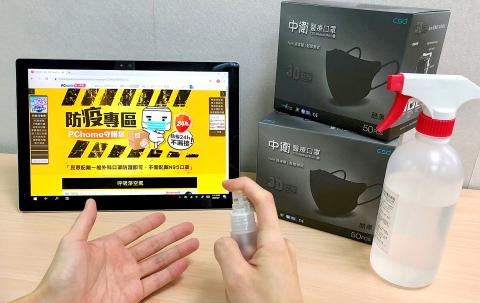The nation’s leading e-commerce operators Momo.com Inc (富邦媒體) and PChome Online Inc (網路家庭) posted record-high sales last month, on the back of the Lunar New Year holiday and growing concern over the spreading 2019 novel coronavirus (2019-nCoV).
Momo saw its revenue grow 15.09 percent year-on-year to NT$4.93 billion (US$163.78 million), while PChome posted a 5.52 percent increase to NT$3.62 billion.
Momo said the holiday boosted sales of food products, gift sets and cosmetics, while PChome said it benefited from robust sales of consumer electronics, including smartphones, with Apple and Samsung being the preferred brands, and home appliances, such as robotic vacuum cleaners and air fryers.

Photo: CNA
As Taiwan last month confirmed its first case of the 2019-nCoV, Momo and PChome said they saw surging sales of N95 respirators, surgical masks and other types of masks, with orders during the holiday growing 7 to 10 times compared with the monthly average.
The two companies added that sales of wet wipes, hand sanitizers and bleach among other disinfecting agents surged during the period.
E-commerce start-up Kuobrothers Corp (創業家兄弟), which reported revenue of NT$383.53 million for last month, said that mask sales increased by more than fourfold, while sales of automatic soap dispensers and air purifiers also rose.
PChome subsidiary Ruten.com (露天拍賣) said that it saw an increase in keyword searches for non-woven fabric and sewing machines as consumers look to make their own masks.
That came after the Central Epidemic Command Center on Jan. 31 centralized the distribution of medical masks and banned their exports.
Sales of board games and video game consoles rose as more people stayed indoors to avoid the virus, tallies compiled by Momo and PChome showed.
Momo reported robust sales of Nintendo Co’s Switch game consoles and games, and Sony Corp’s PlayStation 4 consoles, in addition to healthy sales of automatic mahjong tables.
PChome also reported increased sales of home exercise equipment, such as treadmills and gym weights.
The company said it is looking to further boost revenue this month by promoting Valentine’s Day sales and back-to-school items.
Momo is pushing Valentine’s Day promotions in cooperation with various brands and offering cashback incentives.

SEMICONDUCTORS: The German laser and plasma generator company will expand its local services as its specialized offerings support Taiwan’s semiconductor industries Trumpf SE + Co KG, a global leader in supplying laser technology and plasma generators used in chip production, is expanding its investments in Taiwan in an effort to deeply integrate into the global semiconductor supply chain in the pursuit of growth. The company, headquartered in Ditzingen, Germany, has invested significantly in a newly inaugurated regional technical center for plasma generators in Taoyuan, its latest expansion in Taiwan after being engaged in various industries for more than 25 years. The center, the first of its kind Trumpf built outside Germany, aims to serve customers from Taiwan, Japan, Southeast Asia and South Korea,

Gasoline and diesel prices at domestic fuel stations are to fall NT$0.2 per liter this week, down for a second consecutive week, CPC Corp, Taiwan (台灣中油) and Formosa Petrochemical Corp (台塑石化) announced yesterday. Effective today, gasoline prices at CPC and Formosa stations are to drop to NT$26.4, NT$27.9 and NT$29.9 per liter for 92, 95 and 98-octane unleaded gasoline respectively, the companies said in separate statements. The price of premium diesel is to fall to NT$24.8 per liter at CPC stations and NT$24.6 at Formosa pumps, they said. The price adjustments came even as international crude oil prices rose last week, as traders

Taiwan Semiconductor Manufacturing Co (TSMC, 台積電), which supplies advanced chips to Nvidia Corp and Apple Inc, yesterday reported NT$1.046 trillion (US$33.1 billion) in revenue for last quarter, driven by constantly strong demand for artificial intelligence (AI) chips, falling in the upper end of its forecast. Based on TSMC’s financial guidance, revenue would expand about 22 percent sequentially to the range from US$32.2 billion to US$33.4 billion during the final quarter of 2024, it told investors in October last year. Last year in total, revenue jumped 31.61 percent to NT$3.81 trillion, compared with NT$2.89 trillion generated in the year before, according to

PRECEDENTED TIMES: In news that surely does not shock, AI and tech exports drove a banner for exports last year as Taiwan’s economic growth experienced a flood tide Taiwan’s exports delivered a blockbuster finish to last year with last month’s shipments rising at the second-highest pace on record as demand for artificial intelligence (AI) hardware and advanced computing remained strong, the Ministry of Finance said yesterday. Exports surged 43.4 percent from a year earlier to US$62.48 billion last month, extending growth to 26 consecutive months. Imports climbed 14.9 percent to US$43.04 billion, the second-highest monthly level historically, resulting in a trade surplus of US$19.43 billion — more than double that of the year before. Department of Statistics Director-General Beatrice Tsai (蔡美娜) described the performance as “surprisingly outstanding,” forecasting export growth